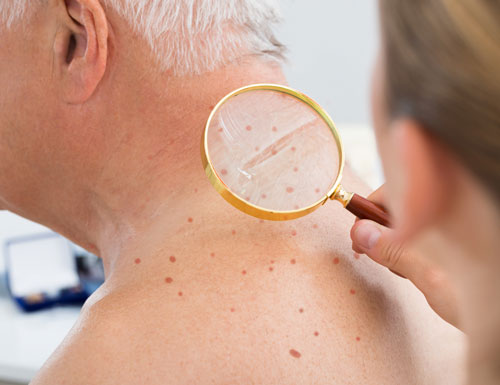 Doctors are often asked when is the best time to be screened for sun damage problems? Consultant dermatologist Dr Deepak Rallan advises: “Don’t let winter be a case of out of sight, out of mind!”
Doctors are often asked when is the best time to be screened for sun damage problems? Consultant dermatologist Dr Deepak Rallan advises: “Don’t let winter be a case of out of sight, out of mind!”
If North American statistics are a reflection to go by, one in five people in the UK will be diagnosed with skin cancer during their lifetime.
Skin cancer causes 2,500 deaths every year across the UK. The good news is that finding skin cancer early saves lives, as it can be easily treated at this stage.
The problem is, not everyone knows how to spot the signs of the disease, or when they should be screened to avoid signs being missed. Fortunately, help is at hand. One of the UK’s foremost skin cancer experts, Dr Deepak Rallan, who runs Diamond Skin Care’s Mole Check clinics in Norwich and Great Yarmouth, has provided this advice on navigating your skin safety.
He says: “GPs and dermatologists across the UK see a rise in skin cancer cases in the summer months. In our own practice, a significant number of patients call for an urgent check of their moles if they have recently had excess sun exposure or inadvertent sunburn.”
However, the real risk of developing skin cancer accumulates over at least a couple of decades. The riskiest events are sunburn episodes, but also frequent and prolonged tanning.
There is no ‘best’ time of year for a mole check. Skin cancer can develop in any month of the year with equal likelihood.
Dr Rallan adds that there are specific times in life when we would recommend a full body skin cancer screen.
The following are some of the major criteria to help you decide when is a good time:
- When you turn 50: As much as people don’t like discussing age, it is a big factor. If you have never had a full body check before, this is the time to start. Cancer Research UK statistics indicate that skin cancer diagnosis rises sharply over the age of 50.
- When you find a mole has changed shape or colour. We remind all our patients that the darkening, enlargement or shape change in a three-four month period is too quick for a normal mole.
- When a new mole appears suddenly after the age of 45, it should be treated with suspicion.
- If someone in your immediate family has been diagnosed with melanoma.
- When it’s coming up to a year since your last check. A skin cancer can stay in the ‘early stages’ for three to four months but by one year, most progress to a higher stage.
Diamond Skin Care offers a full body mole check, with appointments available within five working days in the Norwich and Colchester clinics.
The Mole Check service is an effective and painless service using an advanced technique called Dermoscopy. This technique can spot a cancerous mole much earlier than previously possible, keeping you free from worry and stress about skin cancer.
“It is undeniable that early detection equals life protection,” says Dr Rallan.


